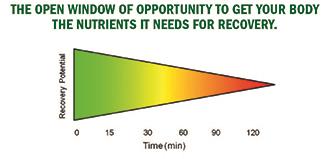Main Menu
0 - Access key details
1 - scroll top
2 - header search
1 - scroll top
2 - header search
Recovery Nutrition
Recovery in 3s: Pre-, During and Post-workout
Pre-workout
- Don't go into your workout with an empty stomach.
- Top off your fuel tank with a small, balanced snack containing carbohydrates, fluids and a small amount of protein about one to two hours before your workout.
- Going into a workout properly fueled will improve performance and jump-start recovery.
- Great pre-workout snacks:
- 1 yogurt with 1/2 cup berries and 3/4 cup high-fiber cereal
- Small bowl of cereal with a banana
- 1/2 turkey sandwich and fruit
- 1/2 peanut butter and jelly sandwich and fruit
- Homemade trail mix: (1 cup high-fiber cereal, 2 tablespoons dried fruit, 2 tablespoons nuts)
- Make sure to hydrate with 16-20 ounces of water.
During Workout
It is important to stay hydrated while exercising.
- How much do you need to drink?
- Losing 2 percent or more of your body weight due to sweating can decrease your performance and put you at greater risk for heat illness.
- A good way to monitor how well you are hydrating is to weigh yourself before and after training.
- Do you need a sports drink?
- No, if...
- Training for less than one hour
- Weight loss is the goal of the training session
- Yes, if…
- Training for more than an hour
- Training in extreme environments
- Lean body mass gain is the goal
- You enter the workout without any fuel
- You have a short, but extremely intense, workout
- No, if...
General Hydration Guidelines During Workouts:
| Maintain Hydration | Maintain Fuel and Electrolytes |
|---|---|
|
|
Hydration Example: 150-pound Sailor
- 2 percent of their body weight is 3 pounds.
- If this Sailor loses more than 3 pounds during their training, they are not hydrating effectively.
Post-workout
- The sooner you get your post-workout nutrition, the quicker you recover.
- Your recovery snack or meal, such as a granola bar with at least 5 grams of protein or a fruit smoothie, makes up one of your five to six meals per day.
The Open Window of Opportunity to Get Your Body the Nutrients It Needs for Recovery
| Re-Fuel | Re-Build | Re-Hydrate |
Within 10 minutes of training:
- Refuel with carbohydrates
The more intense the training, the more carbohydrates you need. - Rebuild with protein
Protein needs post-workout are based on body weight. - Rehydrate with fluid
Drink 20-24 ounces of fluid for each pound lost during training.
What do you need to recover?
| Body Weight (Pounds) | Grams of Protein | Grams of carbohydrates |
|---|---|---|
| 120-150 | 15-20 | 30-60 |
| 151-180 | 20-25 | 40-75 |
| 181-215 | 25-30 | 50-90 |
| 216-245 | 30-35 | 60-105 |
Examples:
- 20 ounces of low-fat chocolate milk and a banana
- Turkey and pasta salad
- Tuna sandwich with baked chips
- Meal replacement bar and 20 ounces of sports drink
- Scrambled eggs or egg whites with whole wheat toast and 6 ounces of juice
- Turkey sandwich and yogurt
- Spaghetti and meatballs
- Fruit smoothie blended with yogurt or whey protein

